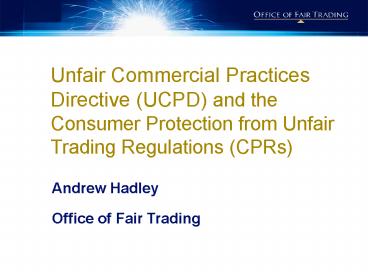Headline here - PowerPoint PPT Presentation
1 / 15
Title:
Headline here
Description:
... consumer protection across the EU. Increases consumer confidence ... The Consumer Protection from Unfair Trading Regulations implement the UCPD in the UK ... – PowerPoint PPT presentation
Number of Views:87
Avg rating:3.0/5.0
Title: Headline here
1
Unfair Commercial Practices Directive (UCPD) and
the Consumer Protection from Unfair Trading
Regulations (CPRs)
Andrew Hadley Office of Fair Trading
2
What I will cover today
- The legislative framework
- The Unfair Commercial Practices Directive and its
prohibitions - Whats going on
- Enforcement and Self-Regulation
3
The Legislative Framework
- UCPD is only part of the range of legislation
affecting B2C transactions - Laws relating to contracts (e.g. Unfair Terms in
Consumer Contract Regulations) - Laws relating to specific products (e.g.
Medicines (Advertising) Regulations) - Laws relating to specific channels (e.g. Doorstep
Selling Regulations / Distance Selling
Regulations) - Laws on B2B activity (e.g. Business Protection
from Misleading Marketing Regulations)
4
What is the UCPD?
- The Unfair Commercial Practices Directive
- Harmonises consumer protection across the EU
- Increases consumer confidence and
- Makes it easier for businesses to operate in
different Member States - There are certain exemptions but otherwise
national law must be brought in line with UCPD
UK will repeal provisions in 22 statutes
5
What is the UCPD?
- It introduces a general duty not to trade
unfairly - Applies to business to consumer commercial
practices directly connected to the sale, supply
or promotion of products to consumers - A principles-based approach instead of the
prescriptive rules we are used to in the UK - The UCPD seeks to ensure that traders act
honestly and fairly towards their customers and
do not unfairly distort their decisions
6
What are the CPRs?
- The Consumer Protection from Unfair Trading
Regulations implement the UCPD in the UK - Replace existing law such as CMARs, TDA and CPA
Part III (23 statutes are affected) - Covers B2C and B2B practices where the consumer
is the end user - Covers all products (including goods and
services) - Before, during and after a contract is made
7
Tiers of prohibitions
GENERAL PROHIBITION (CONTRARY TO REQUIREMENTS OF
PROFESSIONAL DILIGENCE)
must satisfy effect test
MISLEADING PRACTICES
AGGRESSIVE PRACTICES
OMISSIONS
ACTIONS
BANNED PRACTICES (31 SPECIFIC PRACTICES BANNED
IN ALL CIRCUMSTANCES)
deemed effect
8
What will it do? Unfair Conduct
- Three tiers of protection for consumers
- Prohibits actions contrary to the requirements
of professional diligence - About reasonable expectations of honest behaviour
- Specifically prohibits misleading actions and
omissions and aggressive practices - Covers deception, falsehood, omission of material
information, harassment, coercion and undue
influence - More specifically, 31 practices are prohibited in
all circumstances (no effect test)
9
What will it do? Unfair Conduct
- Remember no effect test applies
- False claims of code membership etc (1-4)
- False claims of curing illnesses, dysfunctions or
malformations (17) - False claims related to the use of free or
gratis etc (20)_ - Refusing to leave or not to return to the
consumers home when asked (25) - Suggest you read all of these!
10
What will it do? Unfair Effect
- 31 practices are always considered unfair
- Other prohibitions must show that the practice
has an impact on consumers decisions (or is
likely to) - Causes or is likely to cause the average
consumer to take a transactional decision he
would not have taken otherwise
11
What will it do? New concepts
- Average consumer
- Also protects average member of a group to whom
the practice is directed - Also protects average member of a vulnerable
group (by age, credulity, infirmity) - Transactional decision
- Very wide concept
- Covers any decision before, during or after the
purchase (in relation to product) - Includes decisions not to buy or act (e.g. to
cancel)
12
What happens next?
- Regulations likely to be debated in Parliament in
late April and early March - Regulations due to come into force 26th May
- Final Guidance published after approval
- OFT training enforcers, Consumer Direct and other
bodies - BERR and OFT working on communications strategy,
both short (mainly BERR) and long-term (OFT)
13
Enforcement and Self-Regulation
- OFT and Trading Standards have a duty to enforce,
and can bring civil or criminal action - Sectoral bodies can bring civil actions only
- Other bodies may have some jurisdiction here,
MHRA, Healthcare Commission - OFT is interested in protecting consumers
economic interests - We do this via consultation and advice as well as
formal enforcement actions
14
Enforcement and Self-Regulation
- All enforcers required to act proportionately,
transparently, effectively etc - Have a duty to consult appropriate established
means - Work with trade associations, and particularly
Codes of practice (especially ones that join our
CCAS scheme) - CCAS scheme allows members to use the OFT
approved code logo in shops and advertising etc
15
Unfair Commercial Practices Directive (UCPD) and
the Consumer Protection from Unfair Trading
Regulations (CPRs)
Andrew Hadley Office of Fair Trading 0207 211
8419































